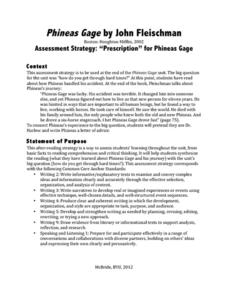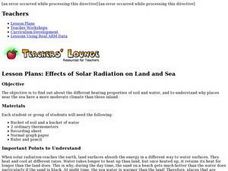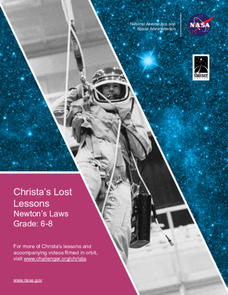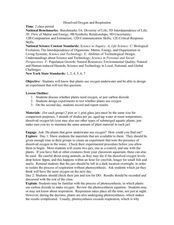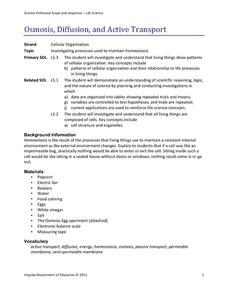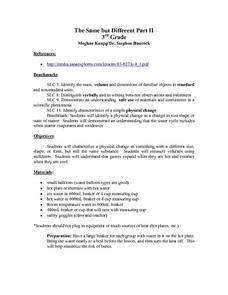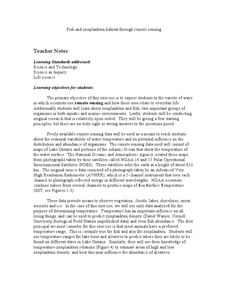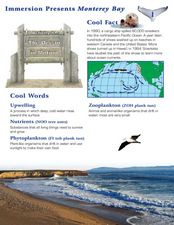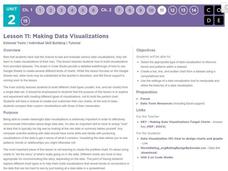Curated OER
Phineas Gage: Assessment Strategy
Close up your study of Phineas Gage: A Gruesome but True Story About Brain Science with a letter-writing assignment. Pupils prepare by journaling and sharing with a partner. They then compose letters that focus on a big idea from the...
Virginia Department of Education
Molar Volume of a Gas
What is a chemist's favorite plant? Stoichiome Tree! Scholars produce hydrogen gas by reacting magnesium with hydrochloric acid. Then they calculate the molar volume of the gas produced before answering assessment questions.
Virginia Department of Education
Heat Transfer and Heat Capacity
It's time to increase the heat! Young chemists demonstrate heat transfer and heat capacity in an activity-packed lab, showing the transitions between solid, liquid, and gaseous phases of materials. Individuals plot data as the...
Virginia Department of Education
The Colligative Properties of Solutions
How can you relate colligative properties of solutions to everyday situations? Pupils first discuss the concepts of density, boiling and freezing points, then demonstrate how to accurately determine the boiling and freezing point of...
Virginia Department of Education
Partial Pressure
At some point, everyone has been under pressure—even Dalton! Explore Dalton's law of partial pressures with young chemists as they measure the volume of air extracted from a sample compared to its original volume. Class...
US Department of Energy
Effects of Solar Radiation on Land and Sea
Earth science enthusiasts experiment to compare the heating rates of soil and water. They relate their findings to the weather conditions near bodies of water. Consider also having middle schoolers measure the cooling rates to...
Curated OER
The Gene Scene
Sixth-grade scientists gain understanding of how genetic traits manifest with simple experiments, such as determining whether their tongues are roller or non-roller, taster or non-taster. Extensions include performing tests at home with...
Virginia Department of Education
Weather Patterns and Seasonal Changes
Get your class outside to observe their surroundings with a lesson highlighting weather patterns and seasonal changes. First, learners take a weather walk to survey how the weather affects animals, people, plants, and trees during...
NASA
Christa's Lost Lesson: Newton’s Laws
How do the laws of motion work in space? Learners explore Newton's laws of motion in different experiments as part of the Christa's Lost Lessons series. They rotate around the room in three stations to experience each law in action using...
Curated OER
Dissolved Oxygen and Respiration
Students are presented with the question, "Do plants that grow underwater use oxygen?" They create an experiment to test the presence of dissolved oxygen in the water using provided materials. Student experiments include a control jar as...
Berkshire Museum
Adopt a Schoolyard Tree
Help young scientists connect with nature and learn about trees with a fun life science lesson. Heading out into the school yard, children choose a tree to adopt, taking measurements, writing descriptions, and drawing sketches of it in...
Virginia Department of Education
Work and Power
Assist your class with correctly calculating the values for force, work, and power as they determine the amount various activities require. They gather data and participate in a group discussion to compare results upon conclusion of the...
Virginia Department of Education
Osmosis, Diffusion, and Active Transport
No, it really is okay to play with your food! Emerging scientists manipulate popcorn, eggs, and other household objects as they demonstrate multiple cellular processes. The activity, capable of modifications, is designed to reflect...
Virginia Department of Education
The Ratio of Surface Area to Volume
Demonstrate the ratio of surface area to volume in your high school class by using phenolphthalein, gelatin, and an onion. Intrigue the class by leading a discussion on osmosis and diffusion, then making "scientific jello." Participants...
Curated OER
Does Mother Nature Know Best?
Investigate herbal medicine in the science or health classroom with this lesson from the New York Times. After a discussion about class members beliefs about and experiences with herbal medicines, pupils read an article that might...
Curated OER
The Same, But Different Part II
Learners characterize a physical change as something that changes to a different size, but retains its basic substance. They measure volumes using milliliters, and perform an experiment that proves that gases expand when hot and contract...
Curated OER
Observation Milk Fat Lesson
Turn your class loose to experiment with the different fat content in skim milk, whole milk, half and half, and heavy cream. This is a visually vibrant experiment, as learners drip food coloring on the surface of the products and measure...
Curated OER
Fish and Zooplankton Through Remote Sensing
Ecology aces examine sea surface temperature maps and relate temperatures to concentration in fish and zooplankton populations. Take your class to a computer lab and provide experience with actual remote sensing data. Some of the links...
Curated OER
The Greenhouse Effect
Why does it get so hot inside of our cars in the summertime? The greenhouse effect! Lab groups experiment to see what happens to an ice cube enclosed in a jar and placed in sunlight as compared to an ice cube outside of the jar. They...
Curated OER
Lab: Reactions of Copper
High schoolers perform a series of experiments on copper to produce a variety of copper compounds. In this chemical reactions of copper lesson plan, students use copper wire and nitric acid to produce copper nitrate. They then form a...
Curated OER
Conservation of Mass
Students conduct an experiment to compare the total mass of products to the mass of reactants. In this conservation of mass lesson plan, students devise an experiment to show that matter is neither created or destroyed in a chemical...
Curated OER
Factors Which Affect Corrosion
Students investigate the factors which affect corrosion. In this corrosion lesson plan, students experiment with 2 nails, copper wire and magnesium ribbon placed in a petri dish of agar solution, potassium ferricyanate and an indicator....
Curated OER
Monterey Bay
Young scholars read background information about Monterey Bay, California, and conduct related experiments. In this ocean in motion lesson, students read information about the location, wildlife, and characteristics of Monterey Bay. They...
Code.org
Making Data Visualizations
Relax ... now visualize the data. Introduce pupils to creating charts from a single data set. Using chart tools included in spreadsheet programs class members create data visualizations that display data. The...
Other popular searches
- Gravity Science Experiment
- Life Science Experiments
- Designing a Science Experiment
- Egg Science Experiments
- Density Science Experiment
- Hands on Science Experiments
- Space Science Experiments
- Food Science Experiments
- 5 Minute Science Experiments
- Simple Science Experiments
- Air Science Experiments
- Fun Science Experiments
